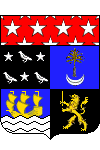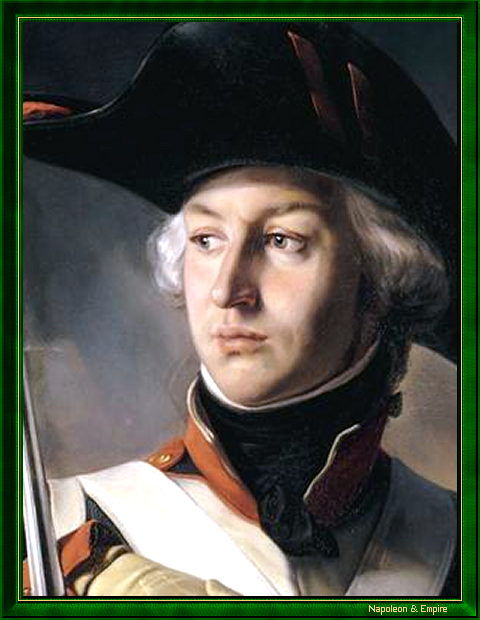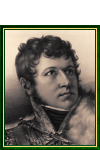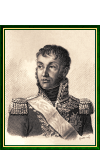Duke of Abrantes
Pronunciation:

Jean-Andoche Junot was born on September 24, 1771 in Bussy-le-Grand, near Alésia in Burgundy, into a bourgeois family. The son of a judge (according to certain sources), he was a law student in Dijon when the Revolution broke out. A student who appeared intelligent but lazy and turbulent. Also, after having dabbled in administration, the young Junot enlisted as soon as the volunteer battalions were created in September 1791.
Junot's destiny was tied at the siege of Toulon. Napoleon Bonaparte noticed this young sergeant there, nicknamed the Tempest
by his comrades for his crazy recklessness. The two men sympathized. Junot became Bonaparte's secretary and attached to his destiny. He shared the dark hours that followed for his leader on 9 Thermidor but took advantage of his fortune after the 13 Vendémiaire. He was then, and for a long time to come, his best friend.
Becoming Napoleon Bonaparte's first aide-de-camp in Italy, Junot distinguished himself at Millesimo and Lonato. He is named colonel.
In iEgypt, during the siege of Saint-Jean d'Acre, he justified his recent promotion to the rank of brigadier general with an exploit. On August 8, 1799, with his 500 men, Junot stopped, near Nazareth, an army of 25,000 Turks sent to help the besieged.
Napoleon Bonaparte couldn't bring Junot back with him from Egypt. However, he quickly called him back, but Junot only finally landed in France on June 14, 1800, after being captured by the English during his return trip. The coup d'état of 18 Brumaire had passed and it was too late to participate in the second Italian campaign.
Junot, however, was immediately appointed governor of Paris (July 27, 1800). He married Miss Laure Martin de Permon (August 30) and was promoted to division general in 1801. The disorderly behavior he then began to indulge in worried the First Consul Napoleon Bonaparte. So much so that in 1804 he did not include him in the list of his marshals. Junot, surprised and disappointed, let his discontent emerge which earned him a golden exile as ambassador to Portugal (March 1805).
Little tempted by diplomacy, Junot abandoned his post upon hearing the news of the opening of hostilities with Austria. He managed to join the Grande Armée in time to participate in the Battle of Austerlitz. After this "exploit" moderately appreciated by the sovereign, Junot went astray again by becoming the defender of with Napoleon I. This banquier's wife, the very worldly Juliette, ran a salon where all the opponents of the Empire met. The reward for all these blunders came in the form of a new exile. The stunned man was sent to Parma to quell a revolt.
On his return, Jean-Andoche Junot was pleasantly surprised to find his post as governor of Paris (July 19, 1806). He responded to the good graces of his friend Emperor by displaying his affair with the latter's own sister, Caroline Murat. New exile. Junot was placed at the head of the army of Portugal and charged with conquering the country.
He achieved this in a few weeks: Junot entered Spain in October 1807, captured Abrantès on November 24 and entered Lisbon on the 30th. Appointed governor of Portugal, he led a sumptuous and lucrative existence for a few months. The landing of English troops commanded by Arthur Wellesley (future Wellington) put an end to it in August 1808. Defeated at Vimeiro on August 21, Junot negotiated and signed the Cintra Convention (August 30). It granted him the repatriation of his army to France.
In 1809, immediately after being made Duke of Abrantès (January 1), Junot returned to Spain where he participated in the siege of Zaragoza. He then commanded the reserve army during the German campaign. Posted again to the Iberian Peninsula in 1810, he did not appreciate finding himself under the orders of André Masséna. The ill will of all the corps commanders (himself, Michel Ney, Jean Louis Ebenezel Reynier) made the expedition a failure. On January 19, 1811, Junot was seriously injured by a bullet in the forehead during the battle of Rio Mayor. He was dying when he was brought back to France.
However, he recovered and obtained leadership of the 8th Corps at the start of the Russian campaign. His inaction allowed the Russian army to escape a decisive defeat on August 19, 1812, at Valoutina. Junot was deprived of his command and accused of lack of resolution in a Bulletin of the Grande Armée. His mental health, already shaky, couldn't withstand these humiliations. He sank definitively into madness.
Napoleon, however, still entrusted him with the government of the Illyrian provinces (February 20, 1813). Junot multiplied his extravagances, to the point of showing up at a ball sparingly dressed only in his decorations. After his admission to retirement, on July 22, 1813, Junot was returned to his father's home, in Montbard in Côte-d'Or. Shortly after, he threw himself from a window and then attempted to amputate himself. On July 29, Junot died from the infection that inevitably followed.
He was buried in the cemetery of the town.
"Jean-Andoche Junot in 1792". Nineteenth century French School.

Junot's name is inscribed on the 33rd column (west pillar) of the Arc de Triomphe de l'Étoile, while a full-length statue of the Duke of Abrantès signed Paul Eugène Breton honors his memory on the north façade of the Louvre , Rivoli Street .
His wife, Laure, Duchess of Abrantès, remarkable for her beauty and her caustic wit, was also extravagant, intriguing and spendthrift, little suited to providing her husband with the balance he himself so lacked.
She earned from the First Consul the nickname "little pest" and from Théophile Gautier, much later, that of "Duchess of Abracadabrantès". Perhaps the poet was thus alluding to the lack of seriousness of her famous memoirs which she wrote, around 1830, with the help of her lover Honoré de Balzac (who came to inscribe her name at the bottom of a long and prestigious list).
After having experienced the most brilliant honors and literary or worldly successes, she nevertheless ended her life in hospital in poverty.
Other portraits

Enlarge
"Jean-Andoche Junot, Duke of Abrantes". Nineteenth century print.

Enlarge
"Jean-Andoche Junot, Duke of Abrantes". Etching by Adolphe Forestier (Paris 1801 - Paris 1885).

Enlarge
"The Duke and the Duchess of Abrantes with their children" by Marguerite Gérard (Grasse 1761 - Paris 1837)